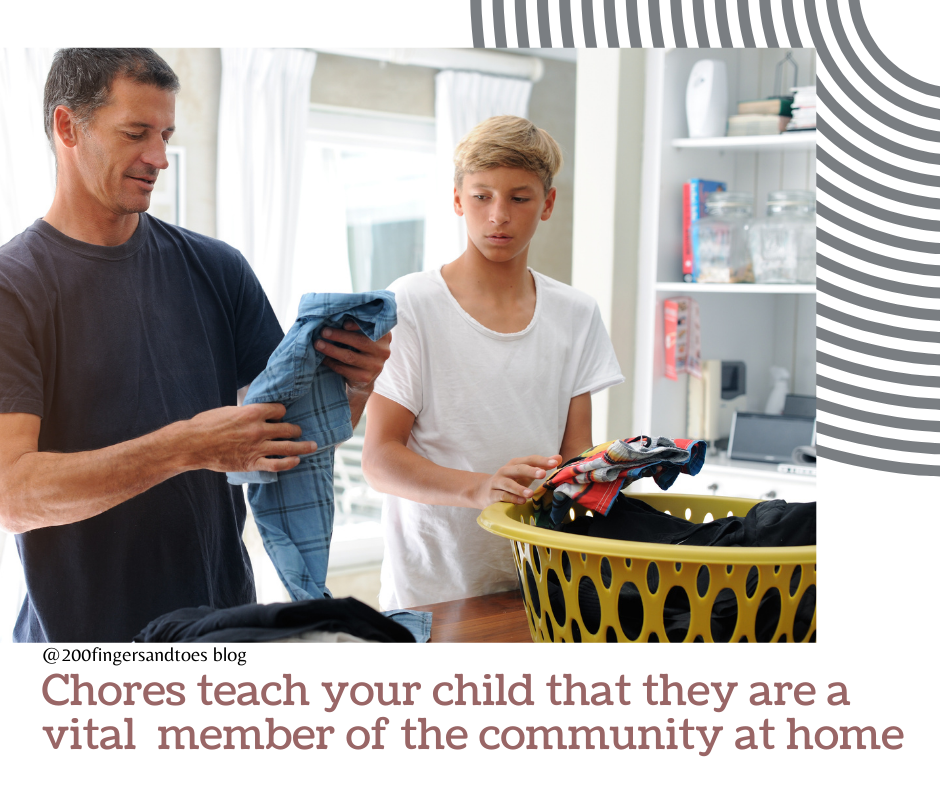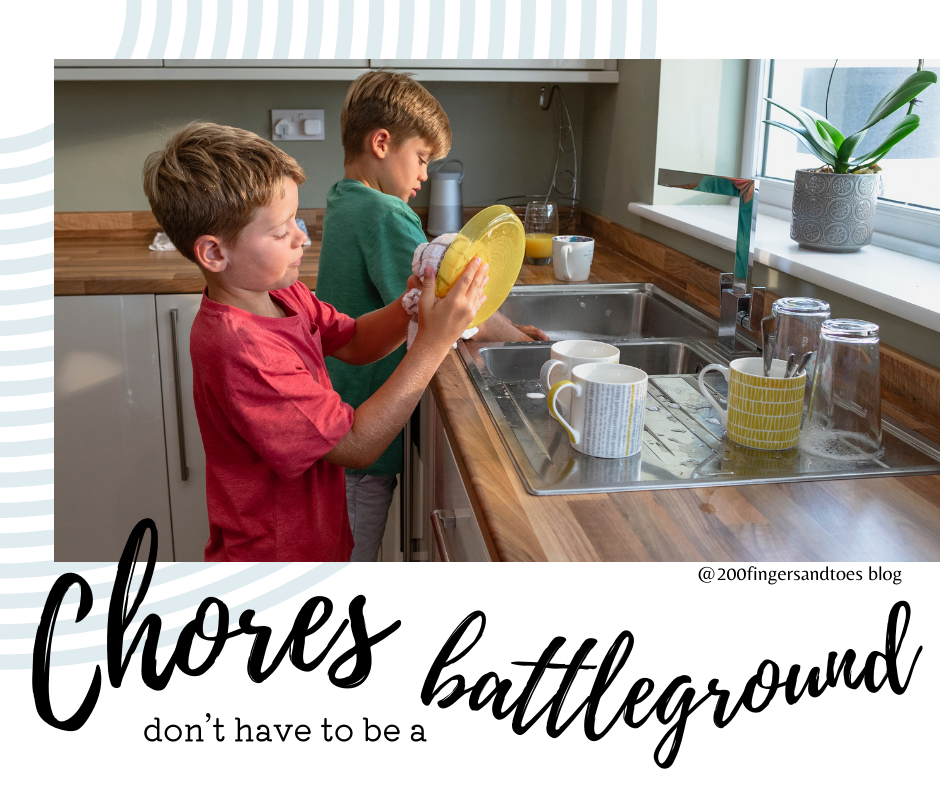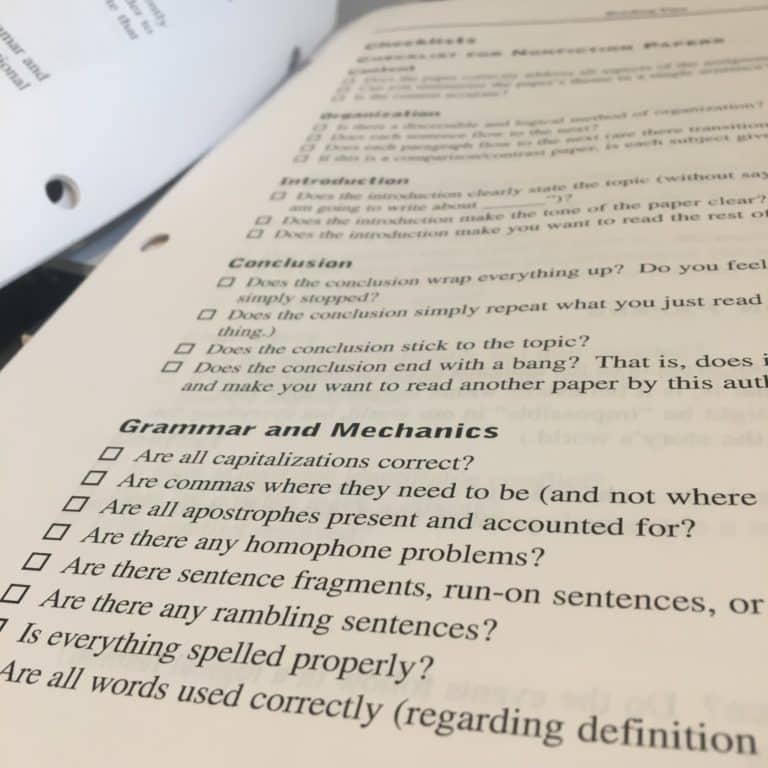Chores Teach Accountability Your Homeschooler Needs To Succeed!
We may earn money or products from the companies mentioned in this review or post, but all opinions are our own.
Household chores teach accountability and are a vital tool in every household, but are even more important structurally in a homeschooler’s home. It is highly likely that one parent is choosing to leave full-time employment to homeschool, but now more than ever, many parents are working and homeschooling. Doing this takes a family working as a team to get all of the chores done.
Chores are so much more than sharing the workload of the home though. Chores are one way you can help your child grow in confidence, and develop a sense of meaning and community. Let me share a few ways chor00s help homeschool students in life.
Chores are Meaningful for Your Child
Chores teach your child that they are a member.
Kids want to be a vital member of the family. Chores help each member feel like they play a vital role. Chores can also help your child to learn to empathize. It is easy to throw dishes into the sink over and over, but when they serve the family as dishwashers for the week, they quickly learn how frustrating this habit can be.
Chores help you child feel confident.
Your children are far more capable than you might expect. In a big family, independence is fostered early by default. As a mother, I wanted my children to be confident and self assured. Giving them jobs like ordering and paying for their own snacks at the counter, making peanut butter sandwiches for their friends, or having an older child run into the store for bread help them learn life skills.

Daily chores teach accountability and responsibility.
We have some chores that are non-nagging chores. For instance, in our house, the kids do their own laundry. They do so from about the age of eight. I don’t nag about laundry. If they have plans and their laundry is not done, they don’t get to go. If there are no towels, they don’t get the shower they planned on. Whenever I can, I let the natural consequences of their actions be the teacher.
They can be mad at me for asking them to do laundry, but when they don’t have pants because they didn’t get to the wash in time, the target is not on mom. They begin to learn that they are responsible for their own personal care. The same goes for showers. (to an extent..a mom has her limits) It only takes a few instances of a tween being left at home to shower because they failed to “remember ” that they were asked to take one the night before.
Instead of nagging, I let the chores teach accountability! Are you falling into the nagging habit? I hope you are encouraged to make a quick reset. Need more help with big parenting changes? You can find the Love & Logic Institute teaching HERE. I am not affiliated with them in any way. Their teaching helped me lead my family with less anger and frustration and more real life problem solving.
Ready for More Skills to help you
40+ Speakers and Leaders
Join the Life Skills Leadership Summit week and add real skills for your whole family. This event is FREE to watch the daily workshops for some of the TOP homeschool speakers, leaders and committed parents like you.
I’ll be speaking about preparing your kids for independent work. Grab your PASS learn with me…
Chores don’t have to be a battle ground.
You teach people HOW you want to be interacted with.
Can you sit with that thought for a minute. Since learning this, I stopped yelling and nagging. (for the most part, as I am still a human and fail on the regular) When the kids mess up, and they DO, I simply reply with, “Not a problem.”
When my kids mess up. I don’t get mad. We skip the yelling. I simply let them know that I am really bummed that they will have to miss out, but I hope they remember next time. I learned this great phrase from Jim Fey from the Love & Logic Learning Center.
Another is, “ I am sad for you,” said without being condescending, but with sincerity. Following up with keeping my word is hard, but raising a spoiled brat is harder. I love my kids enough to disappoint them a few times, to help them learn about managing their personal needs and doing chores in a timely manner.

Make Doing Chores More Fun
Provide all of the tools to do the job well. A few years back I joined Grove.co for natural cleaning supplies and bleach free feminine products. They had these great little buckets with a handle. I ordered one for each bathroom. I ordered a tub and tile cleaner, toilet cleaner and a spray bottle for some general purpose concentrate. It revolutionized the participation level of bathroom cleaning.
Kids love tools. Look at the chores you are asking your kids to do. What are some obstacles to getting them done? Sometimes it is something as simple as a step stool or crate for supplies that makes the job easier to do. In our house sweeping is on the chore list. We are always doing laps in the house looking for a broom. Frustrating! Buying a broom for each level and one for the kitchen made a huge difference.
Sick of chore charts? Read this article about how one large family navigates thier chore system on the Sonlight blog. (my curriculum for the last 20 years)
Chores Teach Accountability, but it isn’t all hard. Got a load of towels?
Gather all the kids and have them fold while you read. Have older kids read while you do lunch prep. Being present can make doing a chore so much easier for your child. I have adopted saying, “let me help you” and jumping in. My hope is that the phrase catches on with each child and they are more willing to lend a hand to myself or others.
Don’t wait, grow resentful or take on all the household tasks. Skip the mom guilt, knowing that chores teach accountability to your kids in ways words just can’t. We lead by example in the middle school years and the better example we are of a willing heart and cheerful spirit, the more likely our kids will pick this up!
Are you looking for more ways to help your child grow into an accountable and responsible teen?
You can read the whole Accountability Series on the blog.
Building Accountability in Elementary Ages
Accountability Habits for the Middle Schooler
Thank for following along!





